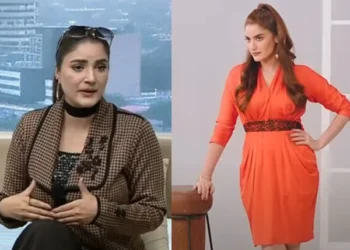Karachi –The tragic passing of actress Humaira Asghar Ali has sparked a heated debate after her mother made emotionally charged remarks accusing the public of Karachi of being “insensitive” and “heartless.” Reacting swiftly, veteran actor Shamoon Abbasi confronted the accusations, urging the family to take responsibility rather than shift blame to society.
Background: Humaira’s Tragic Death and Mother’s Claims
In a moving television interview that aired days after her daughter’s death, Humaira Asghar’s mother painted a bleak picture of life inside Karachi. She recounted screams allegedly coming from Humaira’s apartment, yet no neighbors intervened. The silence, she claimed, spoke volumes.
“I curse the people of Karachi,” she stated, accusing Karachiites of ignoring distress signals while going about their daily routines. She labeled them “insensitive” and “heartless”—remarkable accusations toward a city often praised for its hospitality.
These remarks quickly ignited backlash on social media. Users criticized the mother for accusing the public hastily and highlighted overlooked facts: she and Humaira’s father had lived far from Karachi and initially declined involvement in funeral arrangements. This prompted accusations that they prioritized blame over care.
Shamoon Abbasi Enters the Fray
The Actor’s Firm Message
Shamoon Abbasi, known for his roles in Pakistani cinema and television, responded to the controversy in a heartfelt video message. While acknowledging the family’s grief over Humaira’s death, he emphasized that parental responsibility must come first.
He said:
“We cannot imagine the parents’ pain, but as parents, it was their responsibility to take care of their daughter. When Humaira asked for help, her parents refused to help.”
Abbasi also challenged the claim that Karachiites ignored cries for help, suggesting that if the parents had taken actionable steps—such as hiring someone from Lahore or contacting local authorities—they could have ensured Humaira’s safety and care.
“But the parents shifted the responsibility from their shoulders and blamed the citizens of Karachi.”
The Reaction: Social Media and Public Opinion
Following both the interview and Abbasi’s comments, social media erupted. Karachi residents, civil society activists, and netizens expressed a mix of sympathy for Humaira’s situation and resentment at the sweeping blame on the city.
- Twitter user @KarachiCare tweeted: “How is it easy to blame a city when your own parents never visited? Such irresponsible allegations!”
- Another user, @FilmFanatic, added: “Why not call the police or friend? #Accountability”
Public figures within the entertainment industry also weighed in, with many expressing grief yet supporting Abbasi’s call for accountability over deflection.
Legal and Social Responsibility: What Could Have Been Done
Shamoon Abbasi laid out several practical steps the family could have taken:
- Send loved ones to Karachi – A relative or friend could have flown in to check on her daughter.
- Contact local authorities – The Karachi police and emergency services are equipped to respond to distress calls.
- Collaborate with NGOs and industry peers – Many in showbiz had offered to assist, even pledge funeral arrangements.
These avenues were available to the family, but Abbasi observed that they instead chose to shift the narrative toward public neglect.
Behind the Scenes: Industry Support and Funeral Preparations
Abbasi revealed that various NGOs, industry professionals, and even showbiz families had approached the parents, offering to arrange Humaira’s burial and funeral rites:
“We were in regular contact with NGOs and industry members—if her parents didn’t show, we were ready to take full responsibility.”
This behind-the-scenes solidarity contradicted the family’s public claim of abandonment by society.
Why Parental Accountability Matters
Emotional and Ethical Duty
When a child is in distress—physical, emotional, or otherwise—parental support becomes paramount. Shamoon Abbasi highlighted that:
- It is the moral duty of parents to be physically and emotionally present.
- Parents must act, especially when their children are vulnerable and alone.
Public vs. Private Due Diligence
Dr. Nadia Malik, a sociologist at Karachi University, commented:
“Parents have the primary duty of care. Citizens step in when formal safeguards fail—not as first response.”
She explained that while neighbors and friends can assist, they cannot substitute for immediate parental presence and responsibility.
Reflecting on Karachi’s Response
Karachi—an urban behemoth of over 20 million people—has witnessed serious incidents before. The city’s history includes heartwarming rescue stories and rapid community mobilization during crises.
- From heatwave rescues to public health drives, public volunteers and NGOs have often acted swiftly.
- In this case, if cries were loud enough to hear outside the flat, it would be surprising if no one reacted or called for help.
Abbasi underscored that blaming Karachi without evidence is unfair and inaccurate.
Media Responsibility: Sensationalism vs. Genuine Concern
Media experts warn against sensationalizing grief. Journalist Sara Khan said:
“In emotionally charged interviews, sweeping accusations can do harm and misrepresent reality.”
There is a fine line between valid critique of collective apathy and making unfounded allegations against a city and its residents. Responsible journalism requires nuance and restraint.
Healing and Moving Forward
As the public emotion surrounding Humaira’s death evolves, Shamoon Abbasi offered a path toward constructive dialogue:
- Express grief without vilifying innocent communities
- Encourage families to take action and seek support
- Advocate for systemic support networks, including social services and mental health resources for artists
A more measured, compassionate dialogue can honor Humaira’s memory and prevent future tragedies.
Broader Reflection: Addressing Mental Health in Showbiz
This case also highlights an ongoing issue: the mental health of entertainers, especially those working far from family and facing pressure and isolation.
Support Mechanisms Needed
- Industry unions and entertainment guilds should offer emergency support phones, peer check-ins, and mental health counseling services.
- Publicly funded social support systems should be accessible to freelance artists living away from home.
Conclusion: Compassion with Responsibility
The debate sparked by Humaira Asghar’s mother’s comments and Shamoon Abbasi’s rebuttal touches on deeper issues—family responsibility, collective empathy, societal assumptions, and systemic support. In grief, misdirected blame can cause more hurt than healing.
As a grieving city and a grieving nation, Pakistan must hold both individuals and institutions accountable while fostering compassion, understanding, and concrete measures to protect vulnerable individuals.

























